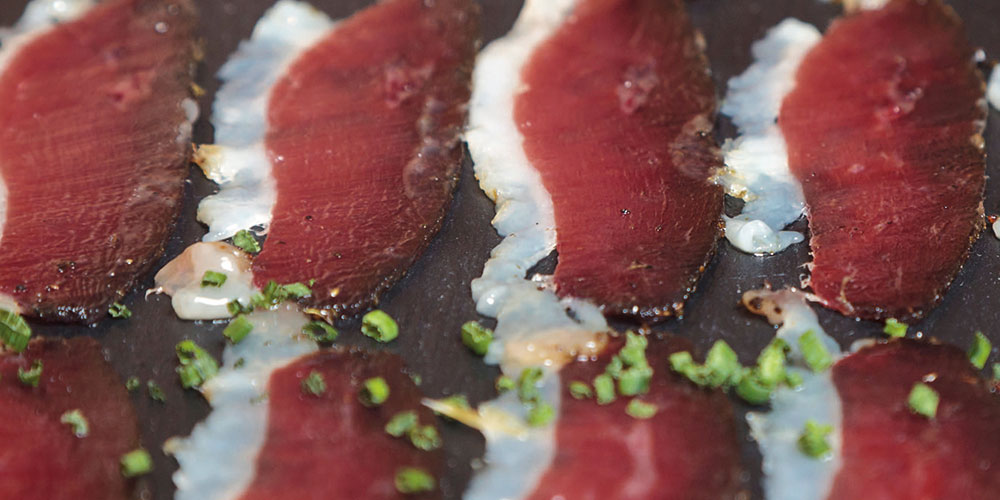
Magret de canard
Serves about 6 people
Preparation time 10 minutes, plus two to three weeks curing
In the 1950s, this dish of succulent, seared duck breast took the fine diners of France by storm. Camille Fourmont has her own take on magret de canard, which involves curing it.
Magret de canard
Ingredients
- 800 g rock salt or coarse grey sea salt
- 1 large duck breast about 340g
- 1 tsp freshly ground black pepper
Instructions
- Put two thirds of the salt in a container that will fit the duck (try a loaf pan for one breast or a 20cm (8in) square pan for two breasts). Place the duck on top, then pour the rest of the salt over it so it is completely covered. Refrigerate and let the meat cure for 12 hours.
- Then take the duck out of the salt and wipe off the excess. Discard the salt. Season the duck with the pepper and wrap it in a clean, dry kitchen towel (avoid flannel towels; thin ones work better).
- Put the wrapped duck on a plate and place it on the top shelf of the refrigerator. Let it cure until firm and dry to the touch, two to three weeks. (I wait until the duck is completely dark on the outside, but still a little pink in the centre. If you wait too long, the breast will be the same colour all the way through and will have turned into jerky.) When ready, it should give slightly when pressed.
- To serve, slice the breast crosswise. (It is easier to slice when cold, but it is better to eat when at room temperature.) Keep any unsliced duck tightly wrapped in parchment paper in the refrigerator so it can breathe
- The cured breast will keep for up to one month, but it will continue to dry out the longer you keep it. Since I like it tender, I prefer to eat it within one week.
* The duck magret in France is larger than most of the duck breasts sold elsewhere. You can also use two smaller breasts, about five to six ounces each. Smaller duck breasts may be perfectly cured in two weeks, so it’s best to follow the texture descriptions in the recipe to know when it’s ready.
**For an alternative version, mix crushed Sichuan (Szechuan) peppercorns in place of some of the black pepper
Extracted from Taste of France Magazine.
Originally from La Buvette: Recipes & Wine Notes from Paris by Camille Fourmont and Kate Leahy, published by Ten Speed Press
Lead photo credit : Magret de canard from Taste of France Mag
Share to: Facebook Twitter LinkedIn Email
More in Cured Duck, Duck breast, Magret de canard




REPLY
REPLY